Last time I told you about Charles Dealtry Locock’s pioneering work in promoting chess for girls in the 1930s, and, in particular about his private pupil Elaine Saunders, the first genuine girl chess playing prodigy.
She wasn’t the first girl chess prodigy, though. Back in 1891 9-year-old Lilian Baird was making headlines round the world with her skilfully constructed chess problems. You can read about her in this book, and find out more about her chess problemist mother here.
Even in 1891, Lilian wasn’t the only chess kid in town. An even younger composer, seven-year-old James Kistruck from the Essex seaside town of Clacton on Sea, was being celebrated as far away as New Zealand…
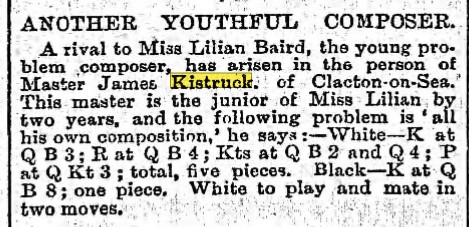
… and Louisville, Kentucky (although he’d apparently moved from Clacton to London).
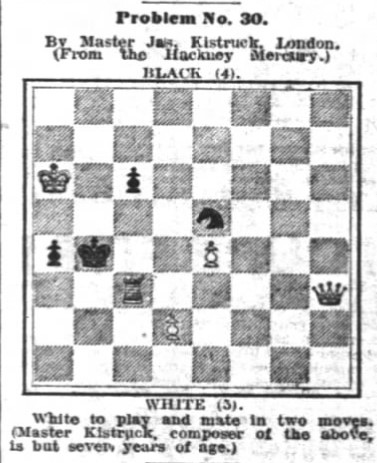
Here, below, is the first problem: very crude and obvious but just the sort of thing a bright 7-year-old might come up with.
The second problem (the Hackney Mercury for 1891 isn’t available online so I don’t have the exact date) is rather more sophisticated. The key move creates no threat, but prepares three different mates depending on which piece Black moves. I’m sure you can work out the solution for yourself, though.
After the publication of these problems in 1891 nothing more was heard from young master Kistruck. Where did he come from and what happened to him next? I really wanted to find out.
Kistruck (some branches of the family used the variant Kistrick) is a very unusual surname, ideal for a one-name study.
The earliest mention online is of the birth of one Hosea Kistrick in the village of Kirtling, Cambridgeshire (south east of the horse racing town of Newmarket) in 1611. By the late 18th century, and now usually known as Kistruck, they’d migrated east to the villages to the west of Ipswich, Suffolk: Aldham, Elmsett and Offton. Like most of the population outside the big cities at the time, they worked in agriculture. While some of them were humble labourers, one branch had done well for themselves, rising to become farmers. These are the people we need to look at.
Rather confusingly, this family had a lot of sons, all with names beginning with J, and always starting in some order (usually with the father’s name coming first) with James, John and Joseph. The family’s favourite sport was cricket, which must have been confusing for the scorers with so many J Kistrucks in the village team, but some of them also had an interest in chess.
Let me take you back to Thursday 12 February 1862. It was a quiet day at Tollemache Hall, but the peace of the countryside was shattered by the sound of a shotgun and a cry of pain. Farmer Joseph Clarke Kistruck’s gun had accidentally been discharged, shooting him in the thigh. The loss of blood sadly proved fatal.
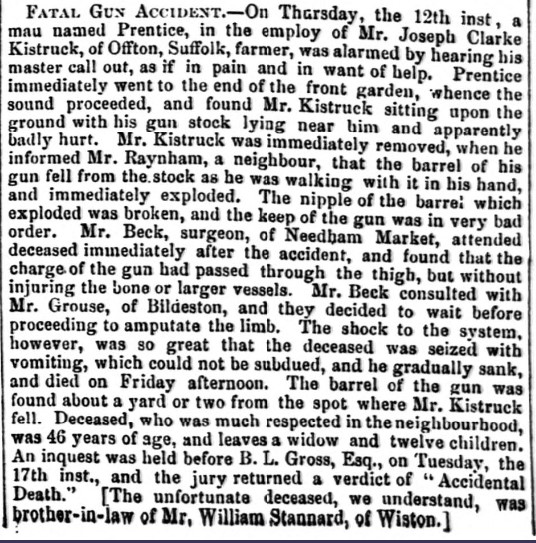
Although the family must have been reasonably well off, it wasn’t going to be easy for his widow Amelia, left with twelve children to look after, and, using the 19th century equivalent of GoFundMe, a fund was launched to help her, soon raising an impressive amount of money.
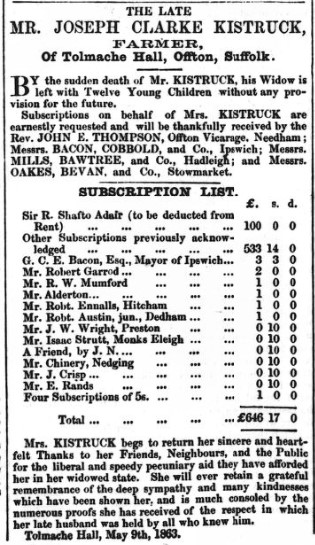
The twelve children included five sons and seven daughters, and, as this is, in part, a one-name study, we need to consider the boys. There were Joseph Clarke junior (1843), James (1850), John (1851), Jeremiah (1852) and Josiah Ernest (1861).


It’s the two oldest of the boys, Joseph and James, who, in a small way, made their names in chess.
Joseph Clarke Kistruck junior moved to Ipswich after his father’s death, where he found work as an engine fitter, marrying in 1877 and then moving to Clacton on Sea, where his son, of course also named Joseph Clarke Kistruck, was born in 1883. (I wonder what he would have thought of Clacton’s new MP.) This was, as regular readers will know, during a decade in which many chess clubs started up, and chess was beginning to look like the game we now know.
In January 1889 a new chess opened in Clacton, and Joseph was one of the first members. On Easter Monday they played a match against a team of visitors, whose number included Joseph’s brother James.
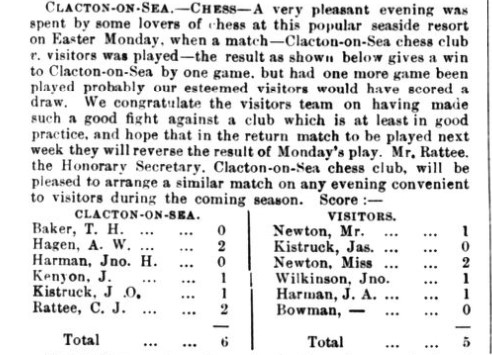
Joseph also took second place in the inaugural club championship, which concluded the following month.
The last time we hear from him, is in a match against local rivals Colchester in 1890. Perhaps he had to retire from chess for health reasons as he sadly died in September 1892. His son, though, followed in his footsteps, playing in a match for Clacton, again against Colchester, in 1906.

James, meanwhile, had moved to London, working for Jeremiah Rotherham & Co, a large department store on Shoreditch High Street, and, unmarried, living on the premises.
His name started appearing in the press in December 1887 as a regular solver of chess problems. Apart from the friendly match against his brother’s team we have no evidence of him playing club chess.
For several years his name was seen regularly in both local and national papers, which, week after week, would publish lists of those who had submitted correct solutions to their puzzles. He was clearly an accomplished solver.
In 1891 he tried his hand at composition, but the g and h files have been cut off in the online newspaper.
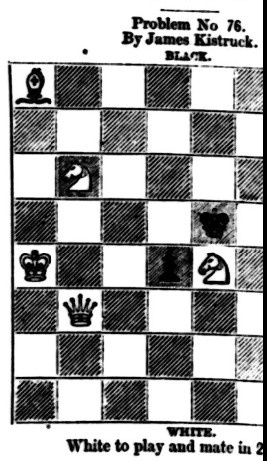
The following week the paper reported that the position, as published, had multiple solutions, and that a black pawn on g7 should be added. The correct solution, if indeed there was one, doesn’t appear to have been published.
If you also add a white pawn on g4 you get a sound, but not at all interesting, mate in 2.
Perhaps any problemists reading this can come up with something better.
By 1893 he was solving far less frequently, and, by the dawn of the 20th century he’d stopped completely, only returning late in life, with mentions in 1928 and 1929, and living on until 1935.
Back in 1909 he unexpectedly married a much younger woman, and their only son, James (of course) Frederick Kistruck, was born the following year. (It looks like they might have had an earlier son with the same name who didn’t survive, and whose birth was registered shortly after his death.) They had now moved out to North London, but he continued working for the same company. Even at the age of 71, in 1921, and by that time living in Wood Green, he was employed as a warehouseman.
There were a couple of other Kistrucks who occasionally solved chess problems. In 1889 there was a J S Kistruck (‘we note the different name’), who might have been a cousin, James Syer Kistruck. In 1893, EE Kistruck from Offton solved a problem in the East Anglian Daily Times. This must have been Joseph and James’s sister Edith Eliza Kistruck (1859-1908): it’s good to know that chess was played by girls as well as boys in the Kistruck family. Edith never married, moving around a lot and spending time with her siblings. In 1885 she gave birth to an illegitimate son, Oliver, in Bethnal Green (near where James was working) who died the following year.
Having looked at the chess careers of the Kistruck family, we need to return to the 7-year-old problemist James Kistruck, living in either London or Clacton, depending on which source you prefer, and having a problem published in Hackney.
James Kistruck was living near Hackney at the time, solving and attempting to compose problems. As of 1891 he had no children. His older brother Joseph was living in Clacton and playing over the board, and had a 7-year-old son, but his name was also Joseph, not James.
It seems to me that this was just a harmless hoax, cashing in on the fame of Lilian Baird to get a couple of problems published. I’d guess James composed them, and used his name, but his nephew’s age and home town to get them published.
If you have any other thoughts, do let me know, and don’t forget to come back soon for another Minor Piece.
Sources & Acknowledgements:
ancestry.co.uk/newspapers.com
findmypast.co.uk/British Newspaper Library
Wikipedia
Yet Another Chess Problem Database (www.yacpdb.org/)
